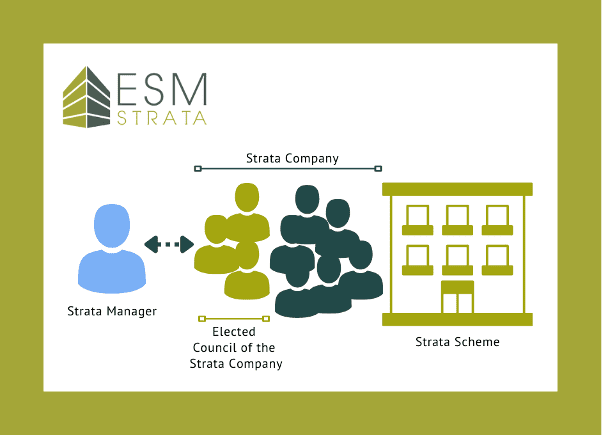In the sprawling landscape of Western Australia, strata communities have emerged as a prominent housing choice, offering a blend of shared amenities, reduced maintenance burdens, and a sense of communal living. However, at the heart of every flourishing Strata Company lies a well-organised and efficient Strata Council.
In Western Australia, the Council of the Strata Company (previously known as the Council of Owners) is elected by the owners at the annual general meeting (AGM). The number of council members can vary depending on the size and complexity of the strata scheme, but there must be at least three members and a maximum of seven members. This range, from 3 to 7 members, is specified in the legislation and provides some flexibility for strata schemes to determine the specific number of council members within that range based on their individual needs and bylaws.
The council serves a number of important roles for the entire Strata Company and are incredibly important to ensure the smooth and effecting running of the scheme.

What is the difference between a Strata Company and the Council of the Strata Company?
A Strata Company consists of the group of owners of a strata titled property. When you own a lot within a strata scheme, such as an apartment or townhouse, you automatically become a member of the Strata Company. This company is responsible for managing the common property and ensuring compliance with the by-laws that govern the strata scheme.
On the other hand, the Council of the Strata Company is a smaller, elected group of owners. This council is chosen by the broader Strata Company to represent the interests of all owners and to manage the day-to-day responsibilities of the scheme. Their duties include overseeing common property maintenance, addressing issues related to by-laws, and working closely with the appointed Strata Manager.
Responsibilities of the Council of the Strata Company:
Being a part of the Council of the Strata Company comes with significant responsibilities. Council members must act in the best interests of the entire Strata Company, as outlined in the Strata Titles Act 1985 (WA). Each member must:
- Act honestly and with integrity
- Exercise due care, skill, and diligence in fulfilling their duties
- Avoid using their position for any improper advantage or personal gain
- Declare any conflict of interest that may impact their role on the council
The Strata Titles Act ensures that council members are held accountable, and failure to adhere to these principles can lead to disputes and potential legal consequences. Particularly in the context of Western Australia, the significance of a capable Council of the Strata Company cannot be overstated, as it serves as the linchpin for maintaining order, enhancing communication, and safeguarding the collective interests of owners. The elected council is responsible for a wide range of things within the Strata Company including:
- Financial Management
- Administration and record-keeping
- Maintenance and repairs
- Enforcement of ByLaws and House Rules
- Insurance
- Communication amongst owners
- Emergency Response
- Compliance with Regulations
The Council of the Strata company may elect to employ a Strata Management Company (like ESM Strata) to act as a professional third-party service provider to support the council and ensure the smooth operation of the strata scheme. Many of the above activities will then be looked after by the Strata Management Company on behalf of the Council of the Strata Company on instruction of the Council.
Who makes up the council?
The Council of the Strata Company is made up of volunteers from the Strata Company who act for and on behalf of all the owners. The Council of the Strata Company operates in accordance with the Strata Titles Act and any specific by-laws in force for the strata scheme. Regardless of the size of your property, there must be a minimum of 3 and a maximum of 7 Council of the Strata Company members.
At each AGM, there will be a motion relating to the constitution of the Council of the strata company and a vote to elect individuals who will form the Council for the next 12 months. The same motion can be added to any general meeting if required.
Any owner can nominate for the position, and a vote is held at the AGM to choose members.
Council members can have various positions including:
Chairperson
A Chairperson is an elected member of the Council of the Strata Company who plays a crucial role in facilitating meetings and ensuring that the council operates smoothly. They are responsible for presiding over meetings, ensuring discussions remain on track, and making sure decisions are made in accordance with the Strata Titles Act 1985 (WA) and the by-laws of the strata scheme.
The Chairperson’s role includes ensuring that all council members have the opportunity to contribute to discussions, that decisions are reached fairly, and that proper procedures are followed during meetings. While they hold an important leadership position, their vote carries the same weight as any other council member, and their role is to guide, not dictate, the actions of the Body Corporate.
Appointing a chairperson often makes dealing smoother, as they can act as the key point of contact between the council of the strata company and the Strata Manager.
Secretary
The Secretary is responsible for issuing notices of meetings, agendas, and taking minutes of meetings – on occasions where the Strata Manager is not present or has not been asked to do so.
Treasurer
The Treasurer will receive a copy of the strata company’s monthly financial statement and will be expected to review any expenses against the agreed budget and check for anomalies. The Treasurer should also monitor arrears and issue instructions to the Strata Manager where debt collection services may be required.
What happens when one of the members resigns?
If a member has resigned before a general meeting there will be a casual vacancy. This can be filled by a vote from the remaining council members. If nobody fills the place, it will remain as a casual vacancy until the next general meeting. To fill a casual vacancy, you will need a majority vote from the remaining elected council members.
What Happens if There is No Council?
Some strata schemes don’t elect a council, meaning that all decisions regarding the property are made collectively by the Strata Company as a whole. Under this arrangement, every owner is responsible for participating in decision-making processes, as required by the Strata Titles Act.
For any action to take place, at least 50% of owners must approve decisions. This requirement can sometimes create delays, especially when it comes to urgent maintenance work or common property issues. Without a council to streamline decision-making, there is a risk of the property becoming less well-maintained or of key matters being delayed for extended periods.
The Strata Titles Act emphasises the importance of governance and encourages the election of a council to ensure the effective operation of the strata scheme. Having an elected council allows for more efficient management of the strata property and ensures that important issues are addressed in a timely manner.
How do I nominate to become a council member?
At each AGM, there will be a motion relating to the constitution of the Council of the strata company and a vote to elect individuals who will form the Council for the next 12 months. The same motion can be added to any general meeting if required, so if you are interested in joining the Council of the Strata Company you will need to ensure you put your hand up in the next AGM or else request a general meeting.
Council Meetings
Council meetings for a strata company are essential gatherings where council members make decisions about managing and maintaining the property. While meetings are not legally required to occur on a strict schedule, they are highly recommended to ensure effective communication and decision-making within the strata company. Council meetings provide a forum for discussing and voting on maintenance, finances, and other matters that impact owners and residents.
To hold a council meeting, a minimum of 7 days’ notice is required unless all council members agree to waive it. Decisions are made by a simple majority vote, and if members cannot attend, they may appoint a proxy. Minutes are kept to record decisions, creating a formal record that can be shared with owners for transparency. Strata managers or a designated Chairperson typically help organize and guide the meeting to stay focused on the agenda, ensuring that each item is discussed and actioned efficiently.
Council meetings are a valuable tool in proactive strata management, helping councils handle issues efficiently and ensure smooth operation of the property for all owners.
- Purpose
Council meetings are recommended to discuss and make decisions on property management, maintenance, and financial matters. - Notice Requirement
A minimum of 7 days’ notice is typically required to call a meeting, though this can be waived if all members agree. - Voting
Decisions are made by a simple majority vote, with tied votes resulting in a negative outcome. - Proxies
Members unable to attend can appoint a proxy, who must also be a registered owner. - Minutes
Meeting minutes are kept as a formal record and can be shared with all owners for transparency. - Conflict of Interest
As per the Strata Titles Amendment Act 2018, council members must declare conflicts of interest in writing and refrain from voting on related matters.
For more information, refer to this factsheet by Landgate on Meetings.
The Role of the Strata Manager
Many strata schemes engage a Strata Manager to assist with the administrative and management tasks associated with running a strata company. The Strata Titles Act outlines that Strata Managers should act in accordance with the Strata Company’s instructions, manage finances, coordinate maintenance, and ensure compliance with by-laws.
The Strata Manager works closely with the Council of the Strata Company, ensuring that decisions made by the council are executed properly. In well-managed strata schemes, an active council that regularly liaises with the Strata Manager can ensure that the property is well-maintained, compliant with regulations, and that all owners are informed and involved in decision-making when necessary.
Why is a harmonious Strata Company important?
Living in a well-managed strata property has many advantages. With an active Council of the Strata Company and a competent Strata Manager, you can rest assured that the property will be well-maintained, by-laws will be enforced, and finances will be managed transparently. This also helps ensure the property maintains or increases its value over time. The Strata Titles Act provides a framework to protect the rights of all owners and ensure that the strata property operates smoothly. However, it is up to the owners and the elected council to ensure the scheme is effectively managed. If you’re living in or considering purchasing a strata property, understanding these roles and responsibilities will help you navigate strata living with confidence.
For more information on strata management, feel free to contact us at ESM Strata. We’re here to assist you in understanding your rights and responsibilities under the Strata Titles Act and to ensure your strata property is well-managed for years to come.
If you have further questions or need advice, give us a call on 08 9362 1166 or email us at info@esmstrata.com.au. You can also learn more about strata by visiting the News and Resources page on our website.
You can learn more about Strata Living on the Landgate website.








